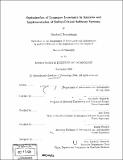| dc.contributor.advisor | Alexandre Megretski, Eric Feron and Emilio Frazzoli. | en_US |
| dc.contributor.author | Roozbehani, Mardavij | en_US |
| dc.contributor.other | Massachusetts Institute of Technology. Dept. of Aeronautics and Astronautics. | en_US |
| dc.date.accessioned | 2009-08-26T16:40:13Z | |
| dc.date.available | 2009-08-26T16:40:13Z | |
| dc.date.copyright | 2008 | en_US |
| dc.date.issued | 2008 | en_US |
| dc.identifier.uri | http://hdl.handle.net/1721.1/46515 | |
| dc.description | Thesis (Ph. D.)--Massachusetts Institute of Technology, Dept. of Aeronautics and Astronautics, 2008. | en_US |
| dc.description | Includes bibliographical references (leaves 168-176). | en_US |
| dc.description.abstract | This dissertation contributes to two major research areas in safety-critical software systems, namely, software analysis, and software implementation. In reference to the software analysis problem, the main contribution of the dissertation is the development of a novel framework, based on Lyapunov invariants and convex optimization, for verification of various safety and performance specifications for software systems. The enabling elements of the framework for software analysis are: (i) dynamical system interpretation and modeling of computer programs, (ii) Lyapunov invariants as behavior certificates for computer programs, and (iii) a computational procedure for finding the Lyapunov invariants. (i) The view in this dissertation is that software defines a rule for iterative modification of the operating memory at discrete instances of time. Hence, it can be modeled as a discrete-time dynamical system with the program variables as the state variables, and the operating memory as the state space. Three specific modeling languages are introduced which can represent a broad range of computer programs of interest to the control community. These are: Mixed Integer-Linear Models, Graph Models, and Linear Models with Conditional Switching. (ii) Inspired by the concept of Lyapunov functions in stability analysis of nonlinear dynamical systems, Lyapunov invariants are introduced and proposed for analysis of behavioral properties, and verification of various safety and performance specifications for computer programs. In the same spirit as standard Lyapunov functions, a Lyapunov invariant is an appropriately defined function of the state which satisfies a difference inequality along the trajectories. It is shown that variations of Lyapunov invariants satisfying certain technical conditions can be formulated for verification of several common specifications. | en_US |
| dc.description.abstract | (cont.) These include but are not limited to: absence of overflow, absence of division-by-zero, termination in finite time, and certain user-specified program assertions. (iii) A computational procedure based on convex relaxation techniques and numerical optimization is proposed for finding the Lyapunov invariants that prove the specifications. The framework is complemented by the introduction of a notion of optimality for the graph models. This notion can be used for constructing efficient graph models that improve the analysis in a systematic way. It is observed that the application of the framework to (graph models of) programs that are semantically identical but syntactically different does not produce identical results. This suggests that the success or failure of the method is contingent on the choice of the graph model. Based on this observation, the concepts of graph reduction, irreducible graphs, and minimal and maximal realizations of graph models are introduced. Several new theorems that compare the performance of the original graph model of a computer program and its reduced offsprings are presented. In reference to the software implementation problem for safety-critical systems, the main contribution of the dissertation is the introduction of an algorithm, based on optimization of quadratic Lyapunov functions and semidefinite programming, for computing optimal state space implementations for digital filters. The particular implementation that is considered is a finite word-length implementation on a fixed-point processor with quantization before or after multiplication. The objective is to minimize the effects of finite word-length constraints on performance deviation while respecting the overflow limits. The problem is first formulated as a special case of controller synthesis where the controller has a specific structure, which is known to be a hard non-convex problem in general. | en_US |
| dc.description.abstract | (cont.) It is then shown that this special case can be convexified exactly and the optimal implementation can be computed by solving a semidefinite optimization problem. It is observed that the optimal state space implementation of a digital filter on a machine with finite memory, does not necessarily define the same transfer function as that of an ideal implementation. | en_US |
| dc.description.statementofresponsibility | by Mardavij Roozbehani. | en_US |
| dc.format.extent | 176 leaves | en_US |
| dc.language.iso | eng | en_US |
| dc.publisher | Massachusetts Institute of Technology | en_US |
| dc.rights | M.I.T. theses are protected by
copyright. They may be viewed from this source for any purpose, but
reproduction or distribution in any format is prohibited without written
permission. See provided URL for inquiries about permission. | en_US |
| dc.rights.uri | http://dspace.mit.edu/handle/1721.1/7582 | en_US |
| dc.subject | Aeronautics and Astronautics. | en_US |
| dc.title | Optimization of Lyapunov invariants in analysis and implementation of safety-critical software systems | en_US |
| dc.type | Thesis | en_US |
| dc.description.degree | Ph.D. | en_US |
| dc.contributor.department | Massachusetts Institute of Technology. Department of Aeronautics and Astronautics | |
| dc.identifier.oclc | 405574886 | en_US |
